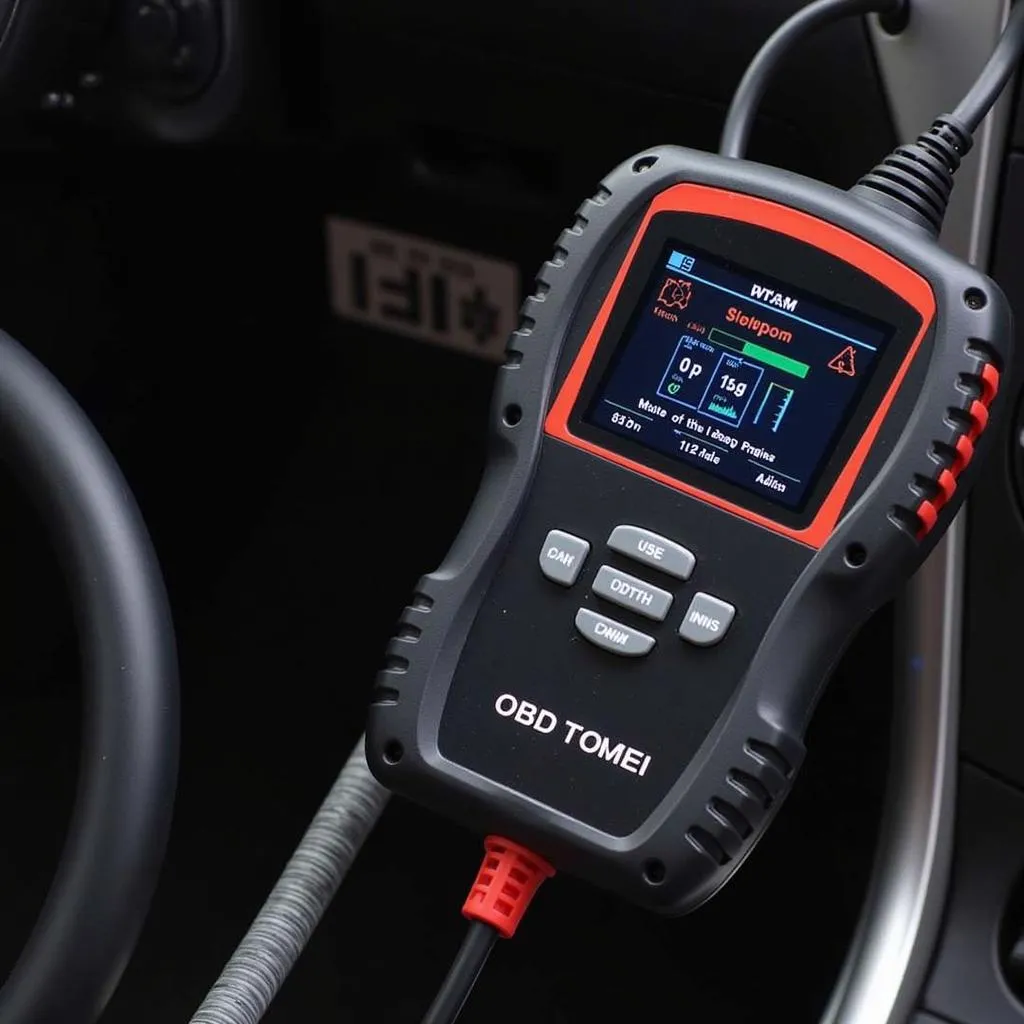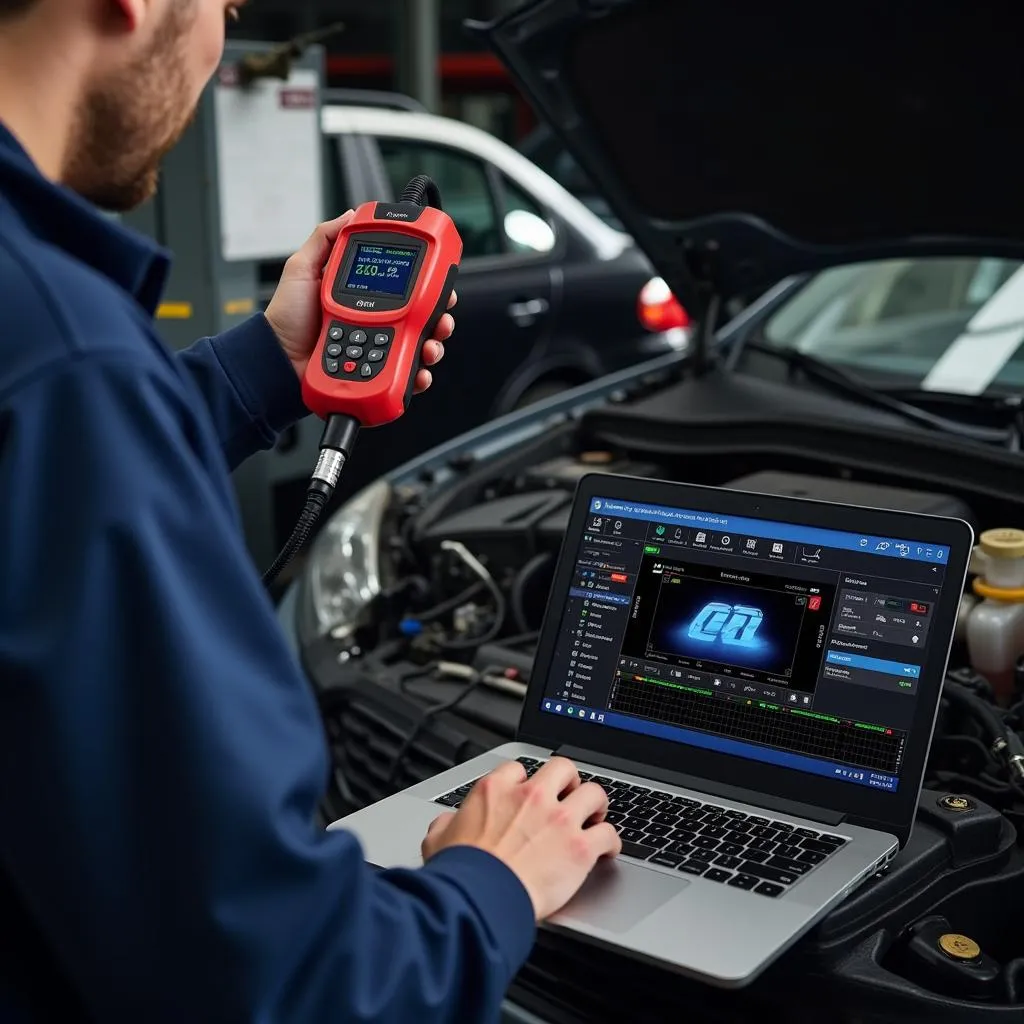Car diagnostics have come a long way from the days of basic engine lights and cryptic error codes. Today, car diagnostic tools empower car owners and mechanics alike to delve deeper into a vehicle’s inner workings, pinpoint issues with precision, and even perform some repairs themselves. This guide delves into the world of car diagnostics, exploring their importance, types, and the benefits they offer.
Why Car Diagnostics Matter
Think of car diagnostics as a window into your car’s health. They allow you to:
- Identify Problems Early: Catching issues early can prevent costly repairs down the line.
- Save Money on Repairs: Knowing the exact problem can save you from unnecessary guesswork and inflated repair bills.
- Gain Peace of Mind: Understanding what’s going on with your car gives you confidence on the road.
- Improve Vehicle Performance: Regular diagnostics can optimize your car’s performance and fuel efficiency.
 Car Diagnostic Tool Connected to Car
Car Diagnostic Tool Connected to Car
Types of Car Diagnostic Tools
A wide range of car diagnostic tools are available, catering to different needs and budgets. Here are some of the most common types:
1. OBD2 Scanners
OBD2 scanners are essential tools for reading and clearing basic diagnostic trouble codes (DTCs). They connect to your car’s OBD-II port, typically located under the dashboard.
- Basic OBD2 Scanners: These affordable scanners display DTCs and their descriptions.
- Advanced OBD2 Scanners: These offer more features, such as live data streaming, freeze frame data, and emissions readiness checks.
- Bluetooth OBD2 Scanners: These connect to your smartphone or tablet, allowing you to view diagnostic information and access advanced features through dedicated apps.
For more information on the best Bluetooth OBD2 scanners, check out our best bluetooth obd2 guide.
2. Professional-Grade Scanners
Professional-grade scanners are more advanced tools used by mechanics and experienced DIYers. They offer comprehensive diagnostic capabilities, including:
- Module Programming: Modifying a vehicle’s control modules for various functions.
- Bi-Directional Controls: Activating specific components like windows, locks, or fuel injectors.
- Advanced Coding: Adjusting vehicle settings beyond basic functions.
3. DIY-Friendly Automotive Scanners
Several user-friendly automotive scanners are designed for DIY enthusiasts. These tools strike a balance between affordability and functionality, offering features like:
- Code Reading and Clearing: Identifying and resetting DTCs.
- Live Data Streaming: Monitoring various engine parameters in real-time.
- Component Testing: Activating specific components to check their functionality.
Looking for the best auto scanner for your DIY needs? Our best auto scanner for diy article can help.
 Mechanic Using Professional-Grade Scanner
Mechanic Using Professional-Grade Scanner
Benefits of Using Car Diagnostic Tools
- Cost Savings: Early detection of problems can prevent minor issues from escalating into major repairs, saving you significant costs.
- Time Savings: Quickly identifying the root cause of an issue minimizes downtime and gets you back on the road faster.
- Convenience: Many diagnostic tools are portable and easy to use, allowing you to perform checks at your convenience.
- Increased Knowledge: Understanding your car’s diagnostics empowers you to make informed decisions about repairs and maintenance.
“Regular use of car diagnostic tools allows car owners to be proactive about their vehicle’s health,” says John Smith, Senior Automotive Technician at XYZ Auto Repair. “This proactive approach not only saves money but also ensures the vehicle’s longevity.”
Choosing the Right Car Diagnostic Tool
With so many options available, selecting the right car diagnostic tool can feel overwhelming. Consider the following factors:
- Your Budget: Diagnostic tools range from affordable OBD2 scanners to expensive professional-grade systems.
- Your Skill Level: Choose a tool that aligns with your technical expertise.
- Vehicle Compatibility: Ensure the tool is compatible with your car’s make, model, and year.
- Desired Features: Identify the specific features that are important for your needs.
The Future of Car Diagnostics
The realm of car diagnostics is constantly evolving, with new technologies and trends emerging. Here are some key developments:
- Telematics: Vehicles are becoming increasingly connected, enabling remote diagnostics and predictive maintenance.
- Artificial Intelligence (AI): AI-powered diagnostic tools can analyze data patterns to predict potential problems before they arise.
- Augmented Reality (AR): AR applications can overlay diagnostic information onto a real-world view of the engine bay, assisting with repairs.
Conclusion
Car diagnostic tools have become indispensable for car owners and mechanics alike. From basic OBD2 scanners to advanced professional systems, these tools empower users to understand, diagnose, and even repair their vehicles with greater efficiency and confidence. As technology advances, we can expect car diagnostics to become even more sophisticated, further bridging the gap between car and driver.
FAQs
Q: Can I use a car diagnostic tool on any car?
A: No. Compatibility varies, so it’s crucial to choose a tool that supports your car’s make, model, and year.
Q: What is the OBD-II port?
A: It’s a standardized diagnostic port found in most vehicles manufactured after 1996.
Q: Can I fix all car problems with a diagnostic tool?
A: While diagnostic tools can identify problems, they cannot fix them. Repairs often require mechanical expertise and specialized tools.
Q: Are expensive diagnostic tools always better?
A: Not necessarily. The best tool depends on your specific needs, budget, and technical skills.
Q: Can I use a car diagnostic tool to reset my check engine light?
A: Yes, most diagnostic tools can clear DTCs, which can turn off the check engine light. However, it’s crucial to address the underlying issue that triggered the light in the first place.
For further information on specific car diagnostic tools, browse our in-depth reviews of laptop automotive scanner and odb2 abs scanner.
Need assistance with car diagnostics or finding the right tool for your needs? Contact us via WhatsApp: +1(641)206-8880, Email: [email protected] or visit us at 276 Reock St, City of Orange, NJ 07050, United States. Our team is available 24/7 to assist you.